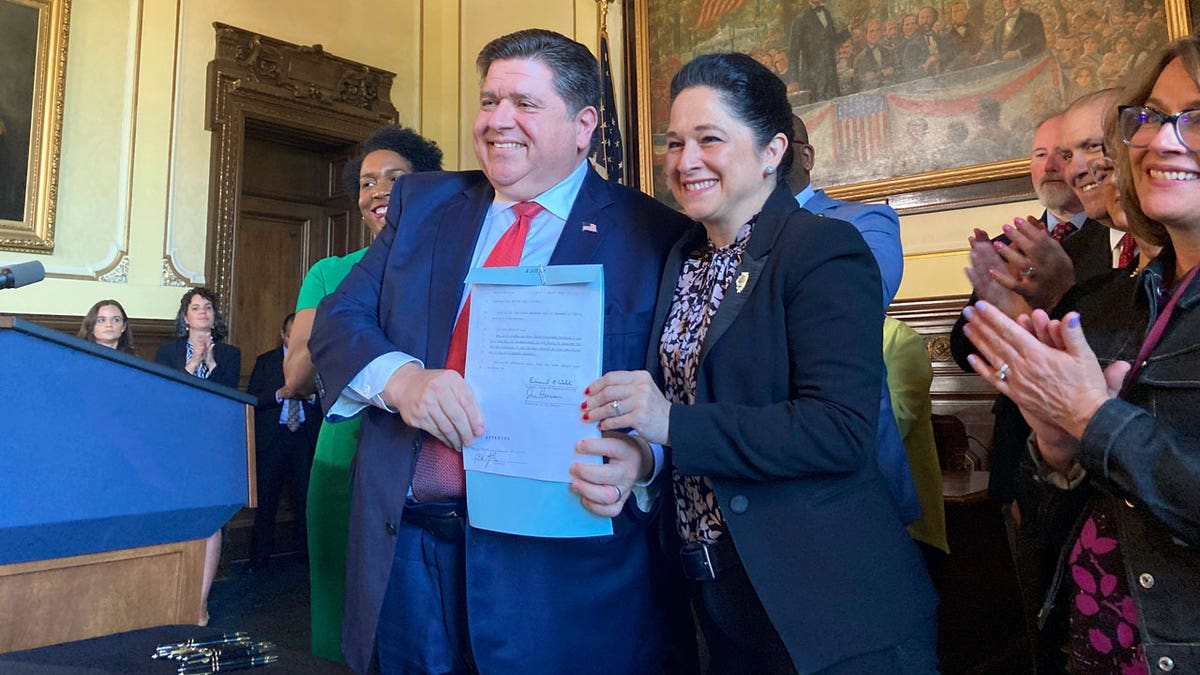Fox News Flash top headlines for May 15
Fox News Flash top headlines are here. Check out what's clicking on Foxnews.com.
April's plummeting general funds receipts — a drop of $1.84 billion from the previous year — is stunning in anyone's estimation. But budget-makers at the state Capitol aren't panicking.
Compared with 2022, revenue fell a whopping 23% last month, driven by a drop of $1.76 billion in personal income tax, according to the legislative Commission on Government Forecasting and Accountability.
On its face, that would seemingly cause jitters and with one week left in the spring legislative session, it might historically be a call for the May money magic from days of yore that led to mountains of debt in the last two decades.
ILLINOIS' 'ASSAULT WEAPONS' BAN COULD BE ON THE CHOPPING BLOCK — AT LEAST TEMPORARILY
The previous year's number for comparison, $5.4 billion, was a record, fueled by an influx of capital gains taxes and because more days of the month fell on weekdays in April 2022, according to Eric Noggle, revenue manager for the bipartisan forecasting commission. Federal data on capital gains tax payments this year aren't immediately available but a weaker market likely meant less return from that.
Gov. J.B. Pritzker pointed out that the budget he proposed last winter for the fiscal year that begins July 1 relies on estimated revenue of $49.94 billion. His Office of Management and Budget currently estimates next year's revenue increase at $532 million, about 1%, more.
At an unrelated bill signing last week, he said that was intentional, anticipating a slowdown in the U.S. economy and the end to federal COVID-19 recovery funds.
"It's actually a lower revenue estimate that was put into my budget than we actually thought. We wanted to make sure that we were being conservative," Pritzker said. "If we pass the budget as it is, that budget would be balanced and we would have a surplus."
Corporate income taxes, which fell in April from the year prior by $94 million, or about 5%, also spike in April, when tax returns are filed. But income tax receipts from withholding come in the other 11 months of the year, and withholding returns are up about 4%, Noggle said.

Democratic Illinois Gov. J.B. Pritzker and other power brokers remain largely optimistic about the states fiscal prospects, despite a reported $1.84 billion revenue decrease in April. (AP Photo/John O'Connor)
"Things are still going OK. It’s just that the performance in fiscal year '22 was so sensational or exceptional, that it was just difficult for us to have that same result in fiscal ‘23," Noggle said.
Despite the downturn, the legislative commission, like the Office of Management and Budget, adjusted revenue for fiscal year 2024 up, albeit slightly — less than 1% to $50.4 billion.
Absent from the Capitol, however, is the flurry of tax-reduction plans Democrats proposed last year, when flush with cash. Pritzker's plan to relieve inflation with tax breaks and holidays was expanded with legislative Democrats' help to $1.8 billion.
Sen. Elgie Sims of Chicago, the Senate Democrats' budget negotiator, said the ability to weather a revenue downturn is bolstered by the discipline Pritzker and Democrats who control the General Assembly have shown since the governor took office in 2019, paying down debt with the notice of Wall Street credit houses and in 2022, hitting a gross domestic product of $1 trillion.
"The changes in revenue, that's something we’ve always known. The overall economy was changing," Sims said. "But the great thing for us is that we built a solid foundation. That’s why you see Illinois economy growing to over $1 trillion, our credit ratings getting upgraded."
Seizing on the sizable revenue drop, progressives in the Legislature pushed tax increases designed to raise hundreds of millions of dollars with what they say is the least amount of pain.
ILLINOIS GRANTS FULL BENEFITS TO CHICAGO FIRST RESPONDERS DISABLED BY COVID
Rep. Will Guzzardi and Sens. Robert Peters and Javier Cervantes proposed a cap on the amount of money retailers can keep for collecting state sales tax as well as a tax on all of a billionaire's assets, including stock portfolios. The plans, they say, would raise $670 million annually for education, afterschool programs, Medicaid expansion and ending homelessness.
The Retailer's Discount allows stores to keep 1.75% of what they collect from the state's 6.25% sales tax. Guzzardi has introduced legislation, HB4071, to increase that to 2% but cap annual collections at $1,000. That would mean an increase or no change to 85% of retailers, Guzzardi said, while limiting the amount big-box retailers can reap for very little effort. Retailers' trade groups traditionally resist any changes to the discount plan.
An even harder fight, Guzzardi acknowledges, would be taxing billionaires' portfolios, along with income. He has proposed the Billionaire Mark-to-Market wealth tax, HB3909.
CLICK HERE TO GET THE FOX NEWS APP
"If you own a home and the value of your home increases, your property taxes increase," Guzzardi said. "Very wealthy individuals make money by the increase of the value of their assets — not on a W-2 like the rest of us. But that income isn’t taxed because it’s not counted as income."













































